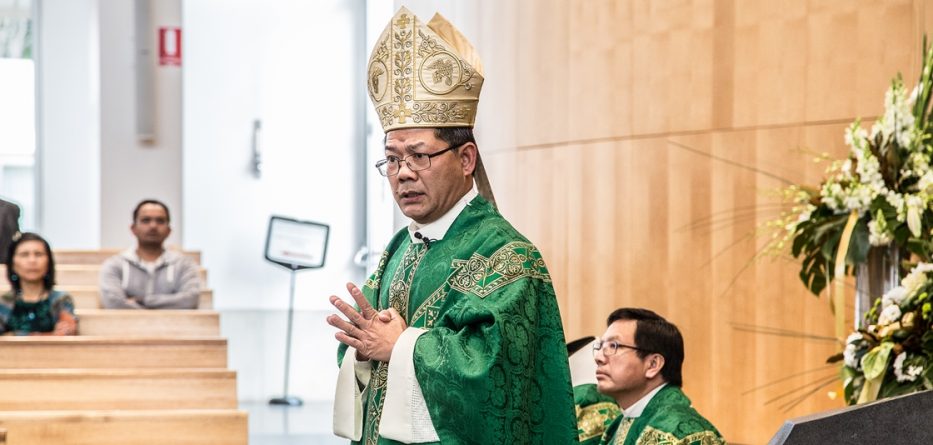Most Reverend Vincent Long Van Nguyen OFM Conv DD STL, Bishop of Parramatta
Homily for the 14th Sunday in Ordinary Time in Year A 2017
9 July 2017
My dear friends in Christ,
I think I would be stating the obvious if I said that it has never been so tough to be a Catholic in Australia. The bad news stories just seem relentless. Many Catholics are scandalised to the point of not wanting to be part of the Church. Many more lose trust and faith in its leadership. The rest, including the most loyal and committed, are wondering where will the public scrutiny and negative publicity take us and how we can move forward. This crisis, together with the increasing secularisation around us, can make us fearful, disconcerted and even despondent. Like the people of God who were caught between the pursuing Egyptian army and the Red Sea, we feel under siege. Nevertheless, if we respond as they did, that is with courage, faith and trust in God, not with fear of the unknown, not with cynicism and nostalgia, we too can accomplish our new Exodus.
This is what we are called to do. As Christians we believe that God is with us and he is acting in history. He is making all things obey his will and bringing it to fulfilment, despite all evidence to the contrary. In the words of St Paul, ‘we know that God causes everything to work together for the good of those who love God’. As a consequence, let us not be afraid of the challenge before us. Instead, let us respond to it with faith, courage and trust, knowing that the God of the Exodus of old is with us now, calling us to live the paschal mystery as it unfolds in our lives and through the ebbs and flows of history.
The Word of God today helps us to see reality through the prism of faith and to live accordingly. In the first reading, the prophet Zachariah addresses the exiles who have returned to their homeland in a state of confusion and uncertainty. They experienced war, displacement and even genocide. The symbols such as the Temple, the priesthood, the monarchy etc… had been destroyed. Their faith in God was shaken to the core. Upon their return from exile, they are unsure as to how God’s promise of a deliverer, a saviour and a Messiah would be fulfilled.
It was against this messianic expectation that Zachariah makes some of the most startling predictions. “Behold, your king comes to you; he is victorious, humble and riding on a donkey.” He will banish the weapons of war and proclaim peace for the nations. We cannot get a more subversive and counter-cultural message than that. The Messiah of Zachariah is an anti-hero. He does not fit into the popular expectations and aspirations of the masses. He is not a warrior but a peace maker; not a conqueror through domination and violence but a humble servant through non-violence and justice. The association with the she-donkey is very telling in that donkey is not an instrument of war like a horse, but of peace. Furthermore, it is considered an unclean animal. By riding on a donkey, then, the Messiah is seen as a reconciler between Jews and gentiles, clean and unclean.
The Gospel today is no less subversive and radical. Jesus declares that the mysteries of the kingdom are revealed not to the learned and the clever, but to mere children or the little ones. In its context, Jesus has encountered much opposition and rejection, particularly from the supposedly enlightened ones like the scribes and Pharisees. He might have felt bitterly disappointed at the lack of success of his mission when he said earlier: “We played the pipe and you did not dance; we sang a dirge and you did not mourn.” In contrast, it was the poor, the gentiles, the unclean, the tax collectors and sinners who are more open and receptive to his message. It was the lowly and insignificant who could best understand God’s revelation. Thus, everything about Jesus smacks of a reversal of human expectation and an affront to human wisdom. And yet, that is precisely the way God has worked in history and continues to work in our lives today. He uses the unlikely, the weak, the lowly, the despised, the rejected to achieve his way.
My dear friends,
As a Church, we are invited to live this time of crisis and uncertainty. In a way, we are in a new exile just like the Jews of old. The Church is being marginalised by the secular society. Its loss in terms of prestige, power, influence and reputation continues unabated. The downward journey seems to mirror that of Christ, which culminated on the cross. Yet we can be confident that God will bring about a purified and revitalised Church, not necessarily large and powerful like the imperial Christendom of old, but a more authentic sacrament of God’s grace in the world. As individuals, we are called to constant conversion and renewal, especially by means of the adverse changes around us. At the end of the day, if God can renew humanity out of a few faithful through the exile, there is hope for us in adversity. We can indeed see adversity as a means of grace and transformation.
Let us pray that we have the courage to respond to God’s call to live our discispleship authentically. Let us pray that we as disciples and community of faith have the courage to walk the downward journey of self-emptying that the humble Messiah exemplified for us, in his words, deeds and relationships. May we follow Christ faithfully even as we – like our Jewish ancestors – are being led to unfamiliar and alien places.








